In New York, 3,500 people from over ninety countries were challenged to have an impact in urban areas in the spheres of action, social involvement and culture. Bill Hybels, Timothy Keller and Mac Pier among more than 50 speakers.
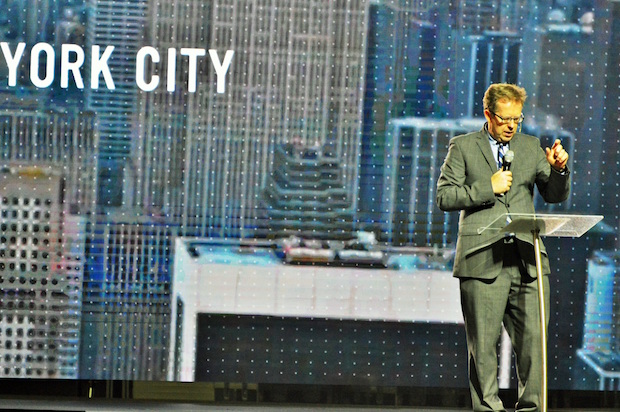 Mac Pier speaks at Movement Day Global Cities 2016. / Jordi Torrents
Mac Pier speaks at Movement Day Global Cities 2016. / Jordi Torrents
Urbanites. Yes, they exist. Whether it’s because they want to, or because they need to, the reality is that our planet’s population has a tendency to concentrate in big cities.
Mac Pier has lived in New York since 1984. Metropolis amongst metropolis. It’s not just where different cultures meet, but an overlapping of these, a true melting pot he got to know living in different city neighborhoods -meeting people from over a hundred ethnic backgrounds- and shepherding a church in which -get this- he’s counted up to sixty different languages!
Pier founded The New York Leadership Center, a ministry aiming at training Christian leaders so they can have an impact in different spheres of the city. This experience started by getting together pastors from different denominations to pray for the city, for the cities. For cities understood as living entities, constantly moving and expressing themselves; maybe that kind of city, as Italo Calvino explained, never really exist, since they are always under construction.
A few years later, those meetings resulted in the creation of a transversal, interdenominational movement which reaches its climax every year with a congress by the name of Movement Day, which was created along with the Lausanne Movement.
Its first edition was in 2010 and it takes place in different cities around the globe. A couple weeks ago it celebrated its sixth congress, the most ambitious to date, with 3,500 people from over ninety countries taking part in it, at the Jacob Javits Center of New York. Pier says that “we are facing a unique, urgent opportunity to empower Christian leaders to change their cities through the impact of the Gospel, especially in areas like poverty, joblessness, education and broken families”. Vision, impact, social action, direct work. Words going back and forth, sharing a discourse around the Movement Day Global Cities (MDGC) which took place from October 24th to the 27th in Manhattan.
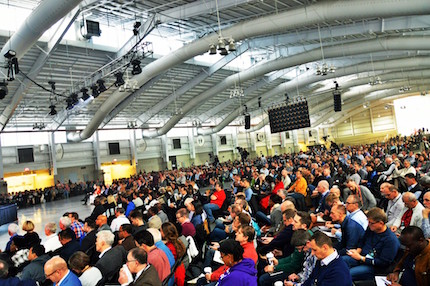 About 3,500 participants from 90 countries travelled to New York to attend the conference. / Jordi Torrents
About 3,500 participants from 90 countries travelled to New York to attend the conference. / Jordi TorrentsRemember this fact: every month, five million people move to cities. That is, every month, a new San Francisco is born. Or a Madrid. Every month! Pier is sure of this: “There are many people who need to know God’s love”, and we need to work for the Gospel, so the Christian population grows faster than the general population.
That is when the Gospel starts having a spectacular effect on the values and on the way cities understand the world. That is when the Gospel goes wild, expanding without any kind of control, in a spontaneous and organic way. How do we achieve this? Pier says that “with local churches that embrace people, with leaders transforming lives in the most marginalized sectors, with people exercising their influence in all the spheres of society -including politics, culture and corporations- and without forgetting the constant need to create networks, to connect people”. Remember this: have an impact, collaborate and transform from being proactive and being part of, far from the very Evangelical idea of seeing the world as something out there, alien to us.
MDGC promotes this transversality, escaping from denominations and formal aspects which, very often, divide more than unite. Inspire, connect, change and empower, let me insist. Over fifty speakers and twenty-two workshops, at the New York Jacob Javits Center -overlooking the Hudson River and the Empire State, next to the High Line, a disused railroad recovered as a walkway and as a space for artistic expression- had a lot to offer: many perspectives, interests and stories converged there. Let me tell you about some of them.
MAC PIER: “CITIES MATTER”
Mac Pier explained how, in 1976, when he was barely seventeen years old, he had an unpleasant encounter, which he calls “demonic”. He grew up in a Christian environment, in a Presbyterian church, although “church had become a series of uninteresting rituals”, which caused his agnosticism to grow on him, together with the rebelliousness typically found in adolescents.
One night he dreamed of complete darkness, from which a fiery-colored figure came out; this figure extended its hands to grab him. He awoke shaken, feeling that his faith in God had come under trial. “God wanted my full attention”, he said, as he did in other situations, like a bicycle accident, or in the funeral of one of his oldest sister’s classmates. Hence, the idea of the “impact on our lives”. Here was the germ of MDGC, centered on the role of cities: “Jesus went to die in Jerusalem, the religious capital of the world, and Paul died in Rome, the political capital. Cities matter, and they are showing the most important demographic change in history”.
Pier, direct and convincing, insisted on the idea of unity, not as an ideal, but as a necessity: “Churches, acting united, transversally -denominations and cultures-, must breath the fragrance of faith. Nevertheless, the division in the church ends up breeding atheism around the world”.
“We are gathering this morning, 95 nations from around the world. You and our being together really is a miracle,” said Pier. “If there is one message for Movement Day, it's simply this: The speed of the Gospel in a city is a proportion to the depth of unity in the same city in the body of Christ. This is a unity rooted in a common vision for our city, deeply rooted friendships, across racial, denominational lines and a passion for the next generation.”
Pier also challenges us by asking: “Do we understand our cities well enough to interpret how God is choreographing nations into our cities? Do we have the cultural agility to identify, celebrate and collaborate with our new neighbors? God wants to disrupt the world with the Gospel through our communities.” Cities are growing at breakneck speed: many cities, especially in China, Africa and Latin America are mushrooming. Pier gives more details: the world will grow by 20 per cent in the next twenty years, to nine billion people, out of which 70 percent will live in urban areas.
Nevertheless, this growth is linked to challenges such as the current refugee diaspora, racism, poverty and human trafficking. Challenges, challenges, and more challenges. “Consider places like London where the majority of church attendees are either Caribbean or African. Consider places like Dubai where there are 400 churches representing the international spectrum. Right here in New York City 90 per cent of the people who attend church are either minority or immigrant. I describe New York City not as an American city but as a very small continent made up of many countries”.
TIM KELLER: “YOU ARE CHRISTIAN, FIRST”
This acclaimed author went to New York City in 1989 with his wife and three children to start Redemeer Presbyterian Church, a church which today serves over five thousand people. New York Magazine publishes a list of the most influential people in the city from different areas of society. On one occasion it defined Keller as “the most influential Christian in New York”. In his address, Keller emphasized the fact that “You’re Christian, first”, referring to the then-incoming US presidential election. “All across the world there is a lot of political fragmentation […] there is more and more political fragmentation in so many countries, and unfortunately Christians might be tempted to be fragmented right along […] I repeat, you’re Christian, first”.
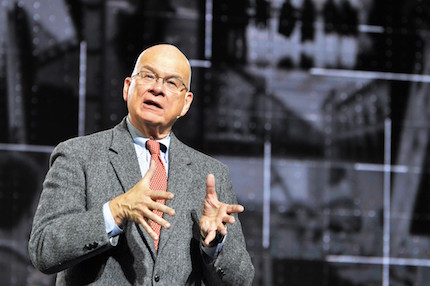 Pastor and author Tim Keller speaks at MDGC 2016. / Jordi Torrents
Pastor and author Tim Keller speaks at MDGC 2016. / Jordi TorrentsKeller talks about a post-Christian culture, a Western secularization plagued by “individualism and secularism”, a reality expanding to the great global cities of the non-Western world. “This is the first non-Christian culture that is based on the rejection of Christianity”, he lamented. If you talk to a Buddhist or a Muslim about Jesus, at the most they’ll tell you that their truth is different, “but in a post-Christian culture they will tell you, directly, that you are wrong, that what you believe in is evil […] The meaning of life is to get rid of the idea that there is any kind of overarching moral norm or absolutes and to be free to live life any way you want”. The author of Counterfeit Gods encouraged people to develop a vision of everyday culture with different parameters: “When I was young”, he says, “the impact of TV on me was limited, since I couldn’t watch more than an hour in the evening, and not even every day. Today, especially the youngest, kids are immersed in a transcultural, digital culture, connected 24/7”.
We must take advantage of this culture, not see it as something foreign: “Christianity is a faith based on conversion, in personal decision”, unlike other religions. How can we put this into practice? Dr. Keller encourages city church leaders to be ethnically diverse. “Go and make disciples”, Keller quotes Jesus’ words, “but knowing how to navigate this post-Christian culture, knowing how to take advantage of the fact that between 15 and 20 per cent of the population in every continent are Christians to become a part of culture, politics and society”.
ZHANG HENG: “WE BAPTIZED MANY IN PRISON RESTROOMS”
Zhang Heng is a pastor in Beijing and an associate director of China Gospel Mission. This introduction is nothing more than a classic line in a business card, another position, another costume in which we could hide. But Heng has a story. And what a story!
Heng recounts how his atheist family, in an atheist country, turned to Christ after he was healed of a rare and serious illness that had left him crippled until 1979. This healing, he said, “triggered his journey into Christianity and also led to the creation of many churches in China”. He really suffered, and was even “on the verge of taking my own life several times”.
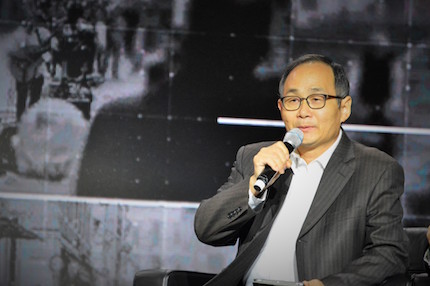 Chinese pastor Zhang Heng. / Jordi Torrents
Chinese pastor Zhang Heng. / Jordi TorrentsBut he “cried out to God and He responded to my plea by sending me a preacher who introduced me to Jesus”. This preacher talked to him about salvation, about Jesus’ death for our sins, and told him that, if he accepted Christ, “he would be forgiven and, maybe healed, too”. Let’s not fool ourselves: Heng himself admits that “I was not too much concerned about forgiveness, all I was concerned about was my own health”. Heng was praying for seven days, after which “I rose up and walked”. This extreme situation was the seed for his family’s conversion and, consequently, for them to start inviting people to share the Gospel and start a new church. At the risk of seeming too showy, Heng confines himself to bearing witness to the multiplying effect of his testimony, since in eight years this modest movement grew to two hundred churches with over two hundred thousand people coming to Christ.
They started a nationwide network, even while suffering significant attacks from Chinese authorities, who threw several leaders into jail. He also spent three years in prison, where he asked God why he had to be in jail: “the Lord told me, ‘there's a need for the Gospel in this place’. So even in the prison we had many come to faith, baptized them in the restrooms”.
Indeed, Christianity is persecuted in China, but reality shows us a country with over one hundred million believers, especially in urban areas, which makes it possible that, in the future, it might become the nation with more believers on Earth. This is a paradox, and yet another example of God’s sense of humor.
JAVIER GARCÍA: “SOCIAL RESPONSIBILITY AND EVANGELISM GO TOGETHER”
Javier García has worked for Agape since 1981. He currently serves as its European director. Aragonese by birth and Catalan by adoption, he is a member of Església Unida in Terrassa (Spain).
In spite of the added pressure of talking as a curtain raiser for Timothy Keller, García was able to raise a challenge: we must transform our societies. Ours, yes. From within. From our everyday life. Fond of quoting different authors, García chose, among others, a quotation from Leo Tolstoy, the Russian writer: “If a man lives, then he believes in something”. This is a clear statement of principle, aiming at faith as the base of our will.
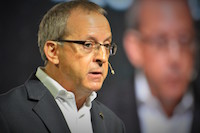 Javier García at MDGC 2016. / Jordi Torrents
Javier García at MDGC 2016. / Jordi Torrents“In a multinational, multiethnic and multicultural world”, he points out, “the challenge lies in connecting with our culture in order to transform our society”. García, full of optimism, raises this challenge: “We are facing a new age. The Modern Era was symbolized by the triumph of reason. Postmodernism is symbolized by the preeminence of aesthetics. On the other hand, hypermodernity represents an unexpected resurgence of spirituality. People need hope in their lives, not uncertainty”.
This spirituality is, and should be, permeable in all the spheres of our lives, from the moment we might close our eyes and raise our hands to worship during a Sunday service to our relationship and involvement with our neighbors, as well as any other routine moment like preparing a cup of coffee or loading the washing machine. This is a global idea which must drink from the most inspiring of sources: Jesus’ example. Javier García continues: “Jesus approached people from a holistic perspective. We should never separate our social responsibility from our evangelistic mission in the city”.
García emphasized the idea that we have received a gift which, in turn, we must keep passing on: “The Christian faith is not for one’s exclusive benefit, but to share wherever God has put you”. The main goal is to provide added value, as Christians, to be part of this world and to establish our credibility: “We have to look after people and work for the prosperity of the city. How? By being visible, by being real in the streets, in the communities”.
García gives a recent example: in the Swiss city of Basel, back in 2013, Protestant and Catholic churches started organizing an event known as the Night of Faith, aiming to establish links between art and the Church. García explained how there were seventy-five free events in forty different spaces (squares, theaters, cafés and also churches) which gathered over fifteen thousand people. Among those taking part in it were the well-known German singer, Nina Hagen, the Spanish mime Carlos Martínez and the American rock band Jars of Clay. Other events also included dance, poetry, theater and literature. Well, it turns out the local government of Basel has already included this night in its agenda for the next two years, as a way to attract more visitors to the city.
This is a simple example of what “the challenge to understand our culture, the priority of proclaiming the Word, and the mission to make disciples wherever God sends us to” means.
Learn more about Movement Day Global Cities 2016 by visiting their website and Facebook page.

Las opiniones vertidas por nuestros colaboradores se realizan a nivel personal, pudiendo coincidir o no con la postura de la dirección de Protestante Digital.
Si quieres comentar o